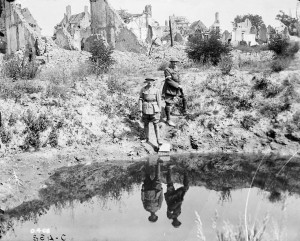Written by guest blogger, Geoff Keelan
Something just never clicked about Canada’s First World War history. Beyond the divides of French and English languages, of social and political history, and other disagreements that weave throughout most Canadian historical fields, something always seemed to be missing. It was a total war that engulfed the country, but national narratives are unsatisfying. It was an extremely personal experience, but individual perspectives don’t capture its enormity. How could an event be so overwhelming in its magnitude – be it on Tim Cook’s “sharp end” or Robert Rutherdale’s “hometown horizons” – yet feel so disconnected?
 A 17′ shell hole in the Main Square, Ypres. Brig.-Gen. Burstall and Captain Papineau. July, 1916. c. Library and Archives Canada.
A 17′ shell hole in the Main Square, Ypres. Brig.-Gen. Burstall and Captain Papineau. July, 1916. c. Library and Archives Canada.Six years ago, I completed my Master’s project at the University of Waterloo on Talbot Mercer Papineau’s wartime correspondence. I argued then (as I do now) that Papineau, despite the acclaim surrounding his writing in 1916, was no French Canadian. Instead, he was the French Canadian that English Canadian patriots most wished to see in the province of Québec – French in name, “English” in spirit. It was a contradiction that Papineau essentially ignored. If he hadn’t died at Passchendaele in October 1917, I wonder how that problem would have been resolved by the young officer.
As I transitioned into doctoral research on his cousin, Henri Bourassa, I kept telling myself one day I would write an article on Papineau to fill out the meagre academic offerings on an individual who had, if only for a few months or years, figured so prominently in the Canadian public sphere. I never did. I could never quite figure out how to address the uniquely Canadian problem of Papineau’s strange place between French and English Canada – straddling both sides of the cultural divide, but fitting into neither.
Years and a doctoral dissertation later, I attended a conference on the First World War hosted by the International Committee of Historical Sciences. For the first time, I learned in detail about European approaches to the messy cultural landscape of the Great War and how they dealt with its complex and sometimes-contradictory nature. I delved into the literature and discovered how historians of Europe struggled with similar problems as I had.
I realized that European approaches, using concepts such as “cultural
mobilization” from John Horne and “war culture” from Stéphane Audoin-Rouzeau and Annette Becker, seem to explain my old friend Papineau. I was approaching Papineau as an individual who denied the reality of French Canada at war – so he could not be a “true” French Canadian – even as he positioned himself and was praised as a voice for the province. This contradiction had led many historians to dismiss Papineau as irrelevant (and rightfully so). Yet, I asked, what if we tried to understand Papineau not within the realm of Canada’s two solitudes, but as a product of a coherent war experience? What if Canadian cultural products like newspapers, speeches, and books, could be understood as reacting to the same thing – the war – and thus point towards a larger framework and connection?
Rather than asking how Canadian war experiences were different, concepts like cultural mobilization and war culture ask us to see the linkages between them. It does not mean that we must view the past as we once did, as a homogenous “national” or “political” undertaking, but it does mean we can understand that separation between French and English or home front and battlefront are not nearly as discrete as we might like. We cannot ignore that Papineau was a frontline soldier reacting to events at home and, though however wrong or right he may have been, he added to others’ understanding of the war and Canada’s place within it when his thoughts were published. Like so many Canadians, he was reacting to a vast mobilization of Canadian identity and culture that defies individual comprehension even as it is built upon it. Individuals contributed to it every day during the war and were likewise affected by it. Affirming, rejecting, or ignoring the war does not belie a link between Canadians connected by that shared cultural space.
I hope that this article sparks further investigation of these ideas in a Canadian context. I do not know if they are the right path, but I believe they at least point to a path forward that addresses some of the problems suggested in the historiographical review of First World War literature in Canada from the September 2014 Canadian Historical Review. For me, these concepts made the disparate experiences of the war suddenly emerge in parallel, following a similar path even if they started and ended at different places.
Geoff Keelan’s article, “Canada’s Cultural Mobilization during the First World War and a Case for Canadian War Culture” is available in the Canadian Historical Review Vol. 97, Issue 3. Read it at CHR Online or on Project MUSE.
Comments on this entry are closed.